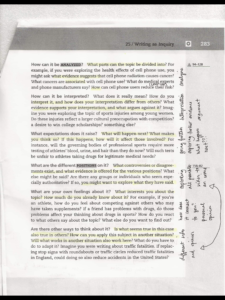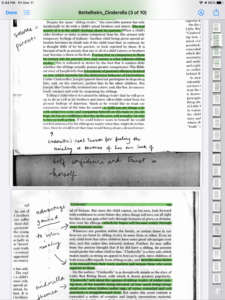I started enrolling for my fall semester classes during the summer of 2020 as an incoming freshman at the City College of New York. I was curious to see how an English college class would differ from an English class in high school. When I registered for my FIQWS classes which were going to be about fairy tales, I was not entirely sure what to expect. Compared to high school, where English Literature and Composition was usually just a single class, I found out that those two components were going to be split into two different classes. As the semester comes to an end, I realize that this class helped me develop and learn different techniques that advanced my writing skills. It allowed me to view literary pieces from a different perspective as well. Although, there are certain areas in which I have not progressed because I feel that I already had a strong start in those; therefore, there aren’t really major changes in my writing.
An English class in college is definitely much more rigorous. We read numerous articles, fictional and nonfictional pieces, analyze different rhetorical situations in writings, and wrote challenging essays. We had three major assignments for this class. First was the literacy narrative, which was an autobiographical essay, so it was not really that hard to write. But the other two major writing assignments that were given to us were something that I was not familiar with. Although I have previous experiences in writing nonfictions, I had never written an exploratory essay and a researched critical analysis. Therefore, their concepts were very new to me and it enabled me to explore a variety of writing techniques and genres. I have also learned how to navigate and utilize the school library’s databases and properly cite the sources that I use in MLA format.
Because of COVID-19, we are currently under difficult circumstances that prompted learning institutions to make a decision to switch to remote learning. It was and still is, a difficult process for me. But this also helped me adjust to using online resources and taking notes virtually instead of on a physical piece of paper. 

Also, because of the number of texts that we were given to read, my reading and annotating skills have improved. I always make sure to note and highlight the important parts of the text so that it will be easier for me to refer to them later on when it is being discussed in class.
My junior year in high school was when I started learning about the topic of rhetorical terms and strategies. I remember learning about the concepts of ethos, pathos, and logos. But this class further developed my understanding of these terms; it expanded my knowledge about rhetorical situations. I paid more attention to my audience, the type of genre that I use, the purpose of the assignment, and my stance, in order to effectively and successfully accomplish whatever literary task was given to us. For example, in my RCA, I talked about the tale of Little Red Riding Hood and how its underlying message is actually very inappropriate considering that it is a popular story read to children. Aside from arguing my opinion on an issue in the story, I also wanted to put an emphasis on how we interpret the meaning of fairy tales as we grow older and point out the subject of rape and victim-blaming. But first, I had to consider my audience in order for me to figure out the type of tone to use in order to get my point and stance across.
Regarding drafting, revisions, or editing, I know that there is always room for improvement, but I feel like I have not really spent that much time or thought on them. Whenever I submit drafts for peer reviews, they are usually just unfinished, but I do not need to make major edits or revisions afterward because there aren’t really any major changes that are needed to be done. But despite having a strong foundation in my writing skills, I still learned something new along the process of writing these academic papers that helped in continuously improve the skills that I already have.





